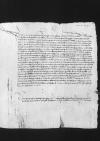List #5001
Albrecht I von Hohenzollern-Ansbach do Ioannes DANTISCUSKönigsberg (Królewiec), 1540-05-26
| odebrano Heilsberg (Lidzbark Warmiński), 1540-05-30 Rękopiśmienne podstawy źródłowe:
Pomocnicze podstawy źródłowe:
Publikacje:
| ||||||||||
Tekst + aparat krytyczny + komentarzZwykły tekstTekst + komentarzTekst + aparat krytyczny
Dem erwirdigenn in Gott unnserm besondernn lieben freundt unnd nachbarnn, herrnn
Unnser freuntlich dinst zuvor.
Erwirdiger in Got besonder lieber freund und nachbar.
Wir haben E(uer) L(ieb) cf.
Nun thun wir unns furs erste E(uer) L(ieb) mit geteyltenn raths zum freuntlichstenn bedanckenn unnd wollenn im inherenn teil sachenn des edlenn unnd erenvhestenn unnsers besondernn liebenn
Nachdem wir auch gegenn E(uer) L(ieb) unnd andernn angegebenn als soltenn wir kurtz hievor vonn der
Abermahls freuntlichs vleis bittendt E(uer) L(ieb) / die wir hiemit dem almechtigenn langwirig gesundt zuerhaltenn bevelhenn / wolle unns inn der altenn freuntschaft unnd lieb derselbenn selbenn selbst schreibenn und erpithenn nach behaltenn und sich nichts davan abwendenn lassenn, / gleichsfals seint wir auch zuthun urputig. /
Dat(um)
Vonn Gotts gnadenn


 BCz, 1606, p. 484
BCz, 1606, p. 484